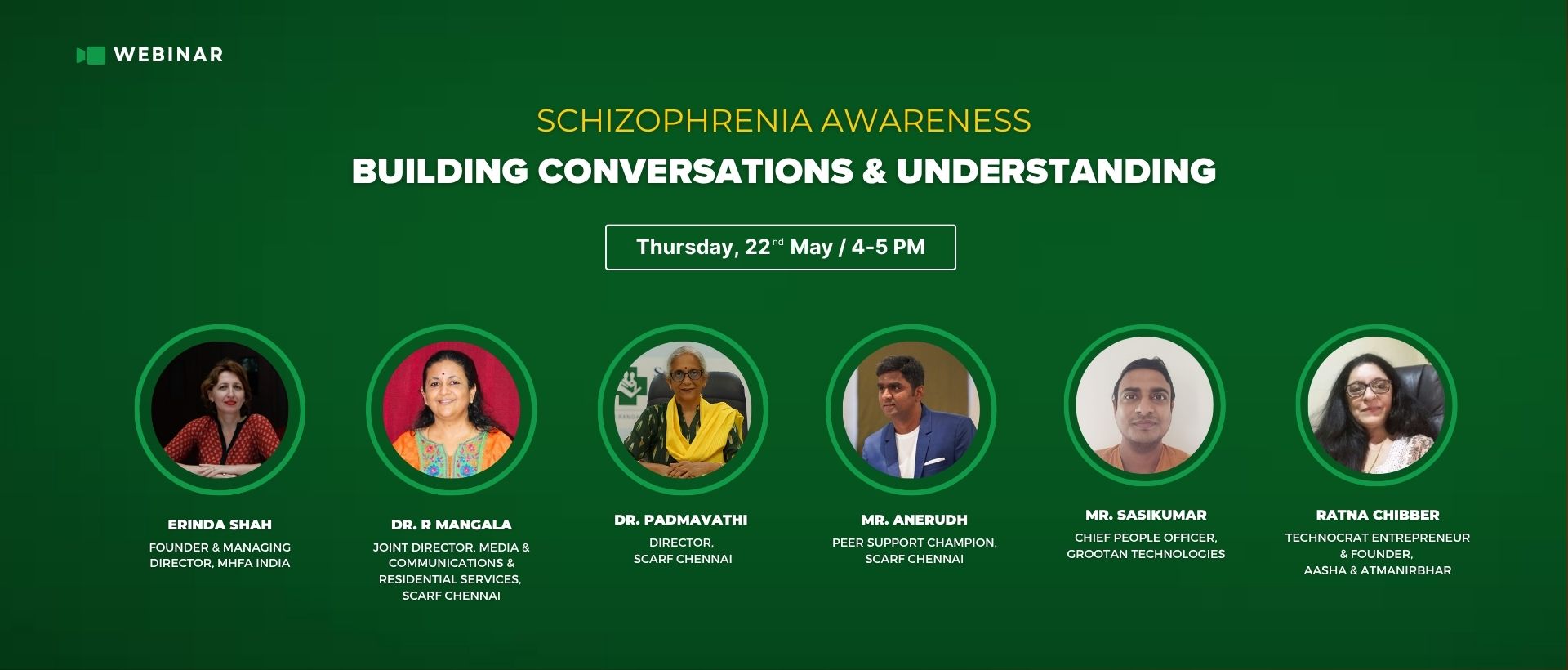
In a country where conversations around mental illness are still shroud in stigma, Mental Health First Aid (MHFA) India hosted a powerful session titled “Schizophrenia Awareness – Building Conversations & Understanding.” The discussion brought together voices from lived experience, caregivers, leading clinicians, and corporate HR professionals to explore the complexities of schizophrenia beyond diagnosis and how dignity, support, and employment can change the narrative.
The Lived Experience: Anerudh N.’s Journey from Diagnosis to Peer Support
Mr. Anerudh N., Peer Support Worker at Schizophrenia Research Foundation (SCARF), Chennai, shared a deeply personal and inspiring account of his journey with schizophrenia:
A former academic and sales professional, Anerudh’s life was disrupted by Schizophernia. With family support and consistent care from SCARF since 2017, he became a trained peer supporter. Today, he offers emotional guidance and practical problem-solving to others with mental health conditions:
Anerudh emphasized the importance of flexible work environments, noting that the minimal deficits caused by the illness make traditional employment difficult. Yet, with the right support and adjustments, people with schizophrenia can contribute meaningfully.
The Caregiver’s Voice: Ratna Chibber’s Mission of Dignity
Technocrat and founder of AASHA and Atmanirbhar Bharat, Ratna Chibber recounted her decades-long journey as a caregiver to her brother living with schizophrenia. Initially unaware of the illness, her family struggled in silence, carrying confusion, stigma, and guilt.
Over time, Ratna transformed that trauma into purpose—choosing to advocate not just for her brother but for countless others facing similar challenges.
She went on to create supported employment opportunities for people with schizophrenia, including community shops and inclusive businesses that provided both dignity and income.
Ratna also emphasized that families must be the first to challenge stigma and lead the way in acceptance:
Clinical Perspectives: SCARF’s Four-Decade Legacy
Dr. Padmavathi Ramachandran, Director of SCARF, Chennai, reflected on the organization’s bold choice of name 40 years ago:
SCARF has led pioneering research, including one of the world’s longest schizophrenia longitudinal studies. But their vision goes beyond clinic:
Dr. R. Mangala, Joint Director – Media, Communications & Residential Services at SCARF, emphasized that medication is only one part of care:
She added:
However, she warned against misconceptions:
Corporate Lens: The HR Reality Check
Shashi Kumari, Chief People Officer at Grootan Technologies, brought in the workplace perspective. His reflections were honest:
He highlighted the need for:
- Mental health-inclusive workplace policies.
- Structured onboarding for neurodivergent employees.
- Leadership-driven culture change.
He urged fellow HR professionals to move beyond fear and towards understanding.
What This Conversation Taught Us
This wasn't just a panel discussion, it was a turning point. The panel, made up of people with lived experience, caregivers, doctors, and corporate leaders, made one thing clear:
Schizophrenia is not the end of someone’s potential. It’s a condition that can be managed, understood, and accommodated.
Key Takeaways:
- Empower Voices: Lived experience and care giving stories are essential in breaking stigma.
- Employability is Real: With flexibility and support, people with schizophrenia can contribute meaningfully.
- Recovery is Holistic: Medication helps, but rehabilitation, routine, and social inclusion are vital.
- HR Needs Support: Knowledge, tools, and leadership backing are necessary to drive true inclusion.
- Stigma Starts at Home: Families must first believe, accept, and advocate.
This conversation was a step forward in building understanding, dignity, and opportunity for individuals living with schizophrenia. The time to act is now, awareness must lead to inclusion.
For the full, uncut version of the conversation and all the valuable perspectives shared, we encourage you to watch the complete video.


